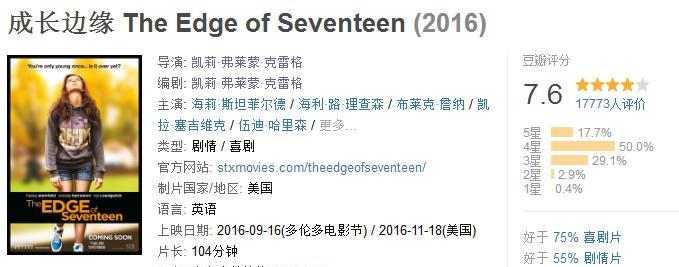Written and directed by young American director Kelly Fremon Craig, the edge of seventeen (2016) presents us with the troubles of American teenagers growing up and more metaphors for the "precocious puberty" of American school students. As the debut work of Kelly Fremont Craig, "Edge of Growth" presents us with a different American youth film based on the associated vision of a little girl gradually growing into a 17-year-old girl.

As director Kelly Flemon Craig, Growing Edge has won several awards including the 74th Golden Globe Awards for Best Actress in a Motion Picture, Musical/Comedy (nominated), 26th MTV Film Awards - MTV Film Awards for Film of the Year (nominated) and Best Performance (nominated), 69th Directors Guild Awards – Best Newcomer Director Award (nominated), 82nd New York Film Critics Association Awards – Best Debut, 22nd American Critics Choice Film Awards – Best Comedy (nominated) and Comedy Film Best Actress (nominated), 15th Washington Film Critics Association Awards – Best Teen Performance (nominated). It can be said that as a debut director, it can win as many awards, which is enough to explain the success of "Growing Edge" and the directing skills of Kelly Flamont Craig.
Since it's an American youth film, there's no doubt that Growing Edge will be compared to several other American teen films — edge of seventeen by David Moreton (1998), Richard Linklater's Boyhood (2014) and everybody wants some !!,2016— but it has a different interpretation of youth. Craig neither explains the growth process of the protagonist Nadine as in "Boyhood" (although "Boyhood" is a classic 12-year-old youth film) the passage of youth, nor does it have the troubles of being filmed as "Teenage Gay" as "Temptation seventeen", but it focuses more on the emotional troubles between the protagonist Nadine's relatives, classmates, girlfriends, teachers, and the choice of facing love feelings during the growth process of the protagonist Nadine.
"The Edge of Growth" tells us the story of Nadine's upbringing from childhood to adulthood (17 years old), saying that Nadine has been a strange and isolated girl since she was a child, causing her to be estranged and unsociable with her mother and brother Darian. Nadine had always thought that her mother loved her brother more and ignored herself, and the perfect image of her brother Darien was even more out of place for the cynical and old Nadine, and the only friends or friends she could get along with were her father and girlfriend Krista. Such a juvenile experience makes Nadine's personality more extreme and rebellious when she grows up.
After a self-drunken party at home with her girlfriend Krista (where her mother wasn't home), Nadine put it this way: "Why am I so ridiculous, how can you like me, which string of yours is wrong, I don't like myself myself, I listened to my own voice yesterday and it sounds like how anyone would want to listen to you." I hate this face when I speak, and when I eat gum, don't let me eat gum? Then I have the worst thoughts, I'm going to end up alone..." This is Nadine's denial of self, this is the negative thought of meeting a crush (Nick) in his teenage school years but not daring to express his inferiority, which is nadine's "youth troubles" caused by long-term loneliness and not getting the attention of those around him.
Director Fremont did not try to explain why Nadine became such a "no popularity", but focused on Nadine's personality characteristics and the characteristics of her dialogue with others, and the expression of this side allows us to more deeply understand Nadine's extreme personality characteristics. Perhaps it is her extreme personality that causes her to grow up "unpopular", and the alienation of the people around her (classmates) from the good has aggravated Nadine's sense of "inferiority", so there is Nadine's desire to merge with others and everything around her.
Nadine was 17 years old at the age of 17, the "sexual" enlightenment stage of adolescence, and curiosity about the opposite sex led to the first crush, Nick, who had only appeared once in school, but Nadine thought she liked him. Nadine's love for Nick, from her liking for another Heterosexual Chinese classmate Owen, can be seen, which is actually based on curiosity and youthful ignorance of the opposite sex, and it is impossible to talk about "love".
However, on the other hand, Nadine's phenomenon of "falling in love" with two boys at the same time can be interpreted as the fact that she needs to get the attention of others through this. Nadine quarreled with her mother and then ran away from home, and even directly put aside the shame of the girl and boldly came out to "eat the forbidden fruit" through the "Facebook" private message crush Nick, this kind of rebellion that tried to "give up on herself" reflected Nadine's extreme personality and misunderstanding of the feelings of men and women. Thankfully, nothing happened to Nadine in the end, just giving her a clearer picture of what kind of person Nick was.
As Nadine's spare tire Chinese student Owen's introverted and "good old man" image, it has attracted Nadine's attention even more. At the end of the film, after Irving's "Film Art Exhibition", Owen and Nadine finally walk together, showing the scene where Owen introduces Nadine to his friends, perhaps not the metaphor is the motive of Nadine and Owen to be "good"? – Just to get to know more friends through Owen to pay attention to yourself? This is the immature "student romance".